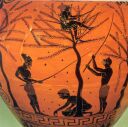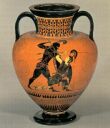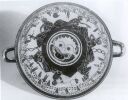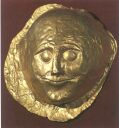Approaching Homer

1
Read together
Reading
sections of the Iliad should prepare you
for more efficient, more
energetic and more productive further reading, and should
inform your participation–
as a listener as well as a speaker–in discussion forums. Each week your approach
to
reading should develop, preparing you also
for your written account of one
passage
for your first
paper. Each week concentrate
on central texts, but also explore readings
in varied media.
Notable characters in the Iliad appeal to
readers and listeners by attempting
Consider
Achilles Curses
Agamemnon

Iliad I, ll 262ff (Fagles p 85)
Odysseus Meets Thersites

Iliad II ll 245ff (Fagles, p 106)
Aphrodite Works

Iliad III ll 146ff (Fagles,
p 132)
Pandarus Strikes

Iliad IV ll 100ff (Fagles, p 148)
Diomedes Wounds Ares

Iliad V ll 998ff (Fagles,
p 192)
Hector Meets Andromache

Iliad VI, 439ff (Fagles, p 208)
Hector Meets Ajax

Iliad VII, V ll 236ff (Fagles, p 221)
Hera & Athena
Face Zeus

Iliad VIII, ll 504ff (Fagles, p 245)
Phoenix Counsels
Achilles

Iliad IX, ll 523ff (Fagles, p 266)
Spies Compete

Iliad X,
ll 523ff (Fagles, p 291)
Sarpedon Seeks
Fame

Iliad XII, ll 337ff (Fagles, p 334)
Hera Seduces Zeus

Iliad XIV, ll 187ff (Fagles, p 374)
Sarpedon’s Last
Stand

Iliad XVI, ll 499ff (Fagles, p 426)
Hector Assumes
Achilles’ Arms

Iliad XVII, ll 159ff (Fagles, p 447)
Hephaestus
Shields Achilles

Iliad XVIII, ll 558ff (Fagles, p 483)
Achilles Goes
Beserk

Iliad XXI, ll 110ff (Fagles, p 523)
Hector Faces
Achilles

Iliad XXII, ll 293ff (Fagles, p 549)
Patroclus’ Final
Appearance

Iliad XXIII, ll 65ff (Fagles, p 561)
Priam Joins
Achilles

XXIV, ll 540ff (Fagles, p 603)
Click for Iliad Passage TOC



2
Approaches to Epic
Following events in Homer's
Iliad offers challenges and presents opportunities. Characters in
the Iliad of course cannot act with full knowledge of
circumstances. Their success, as well as survival, is in training
selective focus on circumstances they presently face, with attention to
shifts in expectations. Consider two features of the Iliad. First,
numerous variations on a common theme occur. Everyone knows the expression
for dying: "bite the dust". But experienced soldiers know that such an end
is the consequence of particular wounds, that myriad other postures mark
memorable endings. Consider the actions of different characters in dying
moments. Patroclus will taunt Hector, forcing upon him the image of
Achilles who will loom above him, a predator far more hateful than Hector
in his present circumstances.
Consider features which characterize Greek
story-telling:
Greek Story-Telling



3
Heroes
Greek heroes survive against great odds to
earn a place in the story, but few survive long, and none find an
afterlife suitable for adventurers beyond the shadowy possibility of
momentary recognition in the memory of storytellers.
Consider the desperate stand of Greeks close
by their ships as Trojans approach their ramparts with blazing torches.
The Greek army faces death by fire with death by drowning close behind.
But consider also the Trojans so near and yet so far from turning the
invaders fated to bring down Troy in flame, presently unable to break
through. Sarpedon, a leading Trojan ally prepares to break through, facing
death from massed Greeks desperate in defense. Sarpedon invites his
younger companion Glaucus to join his heroics, to earn a place in the
story, to live on in memories of future generations. In reminding Glaucus
the costs necessary to validate heroic actins, he steels himself as well
to move towards death:
Sarpedon Seeks Fame

Aristotle offers a Greek
understanding of pride, considering observable qualities in those
recognized as worthy of pride.
Aristotle: Pride

Joan Didion offers a modern appreciation for
those who recognize the costs of actions:
Didion: Morality

Self-Respect



4
Approaching Homer
Read through a book at time without worrying
too much about meaning, but looking for particular scenes you find
memorable. Look for scenes that raise specific questions. Return to a few
of these scenes to consider how events occur in time, with particular
attention to how characters see their changing circumstances. Consider
themes
that will recur in many scenes:
Who is most impressive to fellow soldiers?
What activities get the most respect?
How does conflict arise, and what are the
virtues as well as the costs of conflict?
What is the value of pride, and what costs
attend instances of pride?
How do characters relate to nature in
particular circumstances?
What do characters expect others to approve or
disapprove?
Now consider various particularities of
character, time, place and action.
Appreciating actions through the Iliad
involves your participation in specific settings, particular times and
places, in circumstances which may differ notably from those you find
familiar. Before debating Homeric actions and values consider Homeric
practices. Centaurs, combining the energy of nature with the reflection of
reason, attracted Greeks to the point of obsession. Homeric Greeks
may recognize the dangers of unbridled passion, but they surely found
centaurs captivating as closer to natural forces than mere reasoning man.
Approaching Homer



5
Who's who and what's what
Identification of Greek gods and goddesses may
help. As you trace the interactions of gods and goddesses with particular
mortals, you will come to appreciate their specific powers. Identifying
Athena with wisdom, Aphrodite with love, and Hera with regal power can
focus your attention, but following their activities in specific
circumstances will enable you to discover their personalities. Athena
favors Odysseus, the consummate strategist, and ingenuity rather than
wisdom may better characterize this related goddess and mortal. Aphrodite
favors Paris, and the love she fosters is passion, a passion which
supplants all sense of reason and duty.
Realize that Greek gods and goddesses have
distinctive spheres of influence. Zeus, as the most powerful of them all,
is very different from a monotheistic god. Like an earthly king such as
Agamemnon, many of his associates, not least his wife Hera, test his
authority. He has come to power by overthrowing his own father, and he
fears succumbing to his own offspring. Fate, moreover, not God, determines
the outcome of crucial events. Characters in the Iliad generally act
in credible circumstances. In rare cases gods and goddesses
alter the course of final events by rescuing individuals
from all-but-certain death. In general, however, human events take place
in natural surroundings.
Gods & Goddesses

Identification of Iliad characters may clarify particular scenes.
The Iliad traces the activities of major
fighters. Thersites in Book II offers complaints as a representative of
common foot soldiers, but however important in supporting the great
fighters, common soldiers do not appear as notable, as praiseworthy, as
seekers of fame. You may wish to identify characters appearing in the
Iliad.
Iliad characters

Thomas Bullfinch offers a summary of events preceding and
following the Iliad, as well as those comprising the Iliad. The
Encyclopedia Britannica provides historical background for epic culture.
The Life of Greece provides extended approaches to Greek history and culture. You may find such readings helpful.
Bullfinch on Troy

Britannica Greek History

The Life of Greece


6
Homeric Myth and Epic
Homeric audiences generally would know the
outcome of actions recited by Homer. Homer's success depends not on
suspense, but on the credibility of circumstances, on convincing
characterization, on particularities of time and place which make a
specific action come to life. Actions offer variations on themes. Each
variation traces the various, often unpredictable threads which come
together at a particular moment. Homer’s tapestries characteristically
contrast the expectations of characters with surprises attending shifting
circumstances. A cultivated Greek party-goer centuries more cultivated
than Homeric Greeks, still undergoes age-old transitions: succulent
tastings in good company, rousing melodies, quiescent dreams, but eventual
petrifying nightmares.
Greek myth also incorporates circumstantial
changes. Consider the story oif Arachne, who gives her name to archnids,
spiders. Her art may serve as a model for appreciating the character
of Homer's stories. Like Helen, Arachne was a skilled weaver, one whose
weavings brought to life the settings and activities of all that live and
the natural and cultural settings in which they move. As her reputation
grew, Arachne had reason to consider herself the greatest of weavers.
Challenging Athena to a competition, Arachne showed not the idealized
depiction of order and power presented by Athena, but the deceits
practiced on mortal girls and women by gods. Athena, outraged, turned her into a
spider, and as a spider she continues to weave today.
On any outdoor dark summer evening a curious
modern observer pressing a flashlight to forehead, shining forward into
grass, will discover innumerable green eyes flashing back, the eyes of
spiders, essential inhabitants of suburban nature.
Homeric epic
presents orally accounts of unfolding of natural desires often at odds
with ideals. The story of is supplants the story of should. Myths offer
condensed stories depicting desires in action. Epic, chanted with lyre, a
simple harp, moved audiences by elaborating on the settings, characters
and activities in which myths play out in historical times and historical
places. For a taste of powerful condensation through myth, consider the
compressed variations developed by Ovid in elegant Latin verse:
Ovid: Arachne


7
Homeric Reading and Writing
Reading
sections of the Iliad should prepare you for more efficient, more
energetic and more productive reading for the next assignment, as well as
preparing you for writing an account of one passage for your first paper.
A successful reading enables you and other readers to reread incidents
fruitfully. Fruitful readings
will develop habits of attention essential for an effective Iliad
paper. Selection of specific Iliad passages focus growing habits of
attention on particular events.
Iliad passages

Readings of passages

The Iliad

 a note of thanks for
keeping in touch
a note of thanks for
keeping in touch

